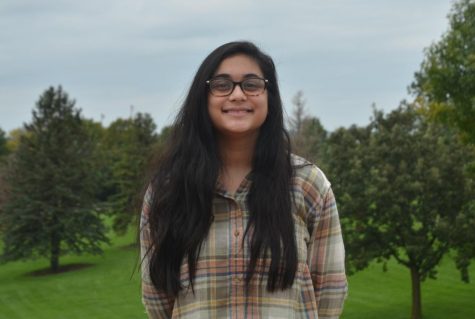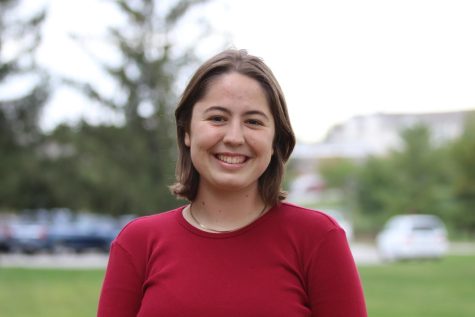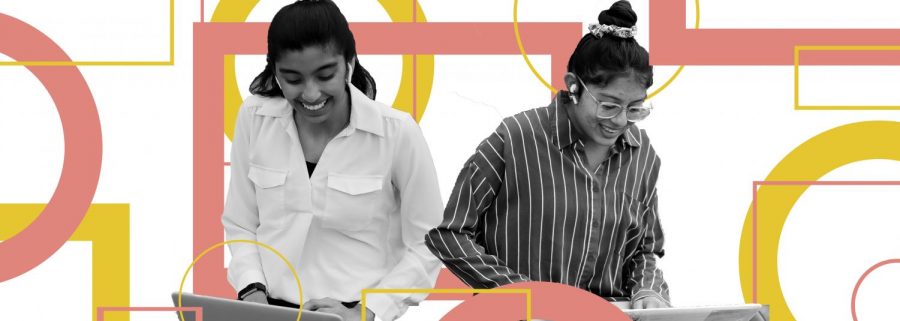Checking your blind spots
Juniors Aasiya Ali and Advika Shah share stories from behind the scenes of creating their new podcast, “Blind Spots.”
Aasiya Ali ’22 and Advika Shah ’22 are bringing awareness to issues of racism and inequity in their new podcast “Blind Spots.”
The best ideas don’t always develop in the shower; they can also unfold in the car. At least they did for friends Aasiya Ali ’22 and Advika Shah ’22. This past October, the pair launched their new podcast “Blind Spots.” As of press time, three episodes have been released: “The Name Change,” “C For Corona Not China” and “Muslim ≠ Terrorist.” The series covers topics of racial injustices and discrimination, comparing and contrasting past and current racism.
“Back in January, Aasiya and I had this really deep conversation in her car. We were just listening to music, and we started talking about minority history, and we realized how passionate we were about this,” Shah said.
The discussion surfaced after Ali and Shah were disappointed by the offered sessions’ lack of depth at Martin Luther King Jr. Day, an event at West where students engage in conversations surrounding diversity, equity and inclusion.
“The conversations about race that should be happening and that need to happen, especially in the classroom and especially at our age … weren’t happening,” Ali said. “The kids in the class and the teachers didn’t really care enough to … have in-depth, meaningful questions or conversations.”
As time went on, the pair began to notice a resurgence of attention surrounding these issues. The Black Lives Matter movement saw a swell in support. Individuals organized rallies and began spreading information through social media. Ali and Shah felt increasingly empowered to speak out.
“We were quarantined, and we weren’t able to contribute to [the BLM movement] as much,” Shah said. “It was driving us crazy. We were like, ‘Oh my gosh, we have to do something about this,’ but attending protests just wasn’t right for us in the middle of a pandemic.”
After taking some time to brainstorm, Ali and Shah decided to create a podcast. However, it was a while before the idea could develop further, as the pair were busy adjusting to the challenges of online school. After finishing their sophomore year, it was time to get to work. Anne Wu ’22, a friend of the duo, was especially impressed with Ali and Shah’s initiative.
“A podcast is a lot of work, but I thought if anybody in my friend group would actually put in the effort to make a podcast … it would be Aasiya and Advika,” Wu said.
Once again, inspiration struck during a car ride—this time during a conversation between Shah and her father about the Washington football team’s former name: the Redskins.
“Break it down: Washington and then Redskins. The word ‘redskins’ has a long history of being used as a term that was used by colonizers when they first came to American to refer to the Native American people,” Shah said. “It is a racial slur whether people want to recognize it or not.”
As the two discussed, Shah’s father suggested that the first episode focus on the name change by examining the parallels of racism throughout history and the present day. Ali and Shah thought this could be used as the premise for episodes moving forward as well.
According to Ali and Shah, creating the podcast was a multistep process. When deciding what to name it, the two hit a roadblock. Ali decided to call her cousin to toss around some ideas, and her cousin suggested “Color Blind.” Shah played off of that idea, and “Blind Spots” was created. Once the title fell into place, the duo needed a cover design.
“We had 15 different logos that either Advika was like, ‘No’ [to], or I didn’t like the color scheme of,” Ali said. “Then finally … we just sat down and busted out one single logo, and we were just like, ‘This is it.’”
The two settled on their current design: a pink square complete with the title highlighted in an array of skin tones.
“We needed to include the skin colors to show different shades of history and to show the depth,” Advika said. “We’re not only talking about black and white; it’s everything in the middle of black and white: all the colors mixed together.”
Before uploading, they also had to figure out the technical logistics. According to Shah, there were several seemingly trivial details they had to work through.
“The moment you start recording you’re like, ‘Oh my gosh, we forgot to think of this,’” Shah said. “If you record through Zoom, sometimes it’ll give you an echo, it’ll lag or there’ll just be empty spaces between both of us talking, and it’s really hard to edit out.”
The friends began experimenting to discover what the best recording method was. Their first attempts included working with Skype and Zoom. However, the audio quality from these video chats was not ideal. In the end, they realized that taping their voices separately on their phones and uploading the sound to iMovie was the best way to resolve the audio quality issue.
“There are obviously tutorials and podcast websites,” Shah said, “but there’s also that feeling that you want to figure it out by yourself. At the end of the day, it’s like, ‘Oh my gosh, we figured out how to use iMovie and edit nanoseconds [for] clips.’ It’s just such a good feeling.”
The two also received some advice from Ali’s soccer trainer, Stevo Krickovic, who has his own podcast and was the one who suggested Ali and Shah use iMovie. However, Krickovic believes minor details such as audio do not matter as much as the overall message of the podcast.
“It’s a nice authentic thing to hear high school students talking about these big topics; it just gives another perspective that you don’t hear all too often,” Krickovic said. “I thought it was easy to follow along … Their flow works really, really well.”
As for the research process, Ali and Shah use the databases EBSCOhost, JSTOR and Google Scholar. Ali’s mother also helped the pair find relevant and credible information. When researching, Shah covers topics of modern racism while Ali looks at deep-rooted oppression throughout history. They both take detailed notes for their respective subjects on a Google document and ask questions to guide their research.
“Those questions really helped us because … I think a lot of times if you have a lot of information it’s hard because you can lose where you’re at and you lose what you’re trying to do,” Ali said. “Those questions really helped us find a focal point.”
After receiving 68 listens in the first couple of days, the two hope to continue spreading information to their peers in an easily digestible manner. In the future, they may have guest speakers and cover topics such as women’s rights and the LGTBQ+ community.
“I want listeners to feel like they learned something new,” Ali said. “I want them to feel that this education will help them somehow.”
Your donation will support the student journalists of West High School. Your contribution will allow us to purchase Scholarship Yearbooks, newsroom equipment and cover our annual website hosting costs.

Fareeha Ahmad is a senior at West High, and this is her second year on staff. She is the profiles editor for print and the copy editor for yearbook. When...

(she/her) Audrey is a senior and has been on the West Side Story staff for 3 years. She is the Copy Editor for the WSS website this year. For fun, she...




